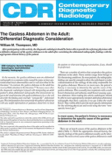
Contemporary Diagnostic Radiology
Scope & Guideline
Innovative Insights in Diagnostic Radiology
Introduction
Aims and Scopes
- Diagnostic Imaging Techniques:
The journal features research on various imaging modalities, including MRI, CT, ultrasound, and PET/CT, emphasizing their application in diagnosing a wide range of diseases. - Interventional Radiology:
There is a significant focus on interventional procedures, exploring the techniques and outcomes of minimally invasive treatments guided by imaging. - Pediatric Radiology:
The journal addresses unique challenges and considerations in imaging children, providing insights into pediatric-specific conditions and diagnostic approaches. - Anatomical and Pathological Correlations:
Research often links imaging findings with anatomical and pathological insights, aiding in the understanding of disease processes. - Emerging Technologies:
Contemporary Diagnostic Radiology is keen on publishing studies related to new imaging technologies and methodologies, including advancements in artificial intelligence and machine learning in radiology.
Trending and Emerging
- Artificial Intelligence in Radiology:
The integration of AI and machine learning in diagnostic imaging is rapidly growing, with studies exploring how these technologies can improve diagnostic accuracy and workflow efficiency. - Imaging in Oncology:
An increasing number of papers focus on imaging techniques for cancer diagnosis and treatment, particularly in relation to personalized medicine and targeted therapies. - Interventional Techniques in Managing Complex Conditions:
There is a rising trend in the exploration of interventional radiology techniques for treating complex conditions, emphasizing the role of imaging in guiding these procedures. - Multimodal Imaging Approaches:
Research is increasingly looking at the benefits of combining different imaging modalities to improve diagnostic capabilities and patient management. - Pediatric Imaging Innovations:
Innovative approaches to pediatric imaging are emerging, focusing on minimizing radiation exposure while maximizing diagnostic efficacy.
Declining or Waning
- Generalized Imaging Reviews:
There has been a noticeable decrease in publications that provide broad overviews of imaging techniques without specific clinical context, as the focus shifts towards more targeted studies. - Non-Specific Case Reports:
The frequency of non-specific case reports has diminished, indicating a trend towards more robust studies that offer significant clinical implications or contribute to evidence-based practice. - Traditional Radiology Practices:
As the field evolves with technological advancements, traditional practices that do not integrate new technologies or methodologies are becoming less common in published research.
Similar Journals
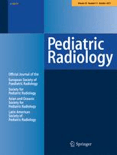
PEDIATRIC RADIOLOGY
Enhancing diagnosis and treatment in pediatric medicine.Pediatric Radiology is a leading journal published by Springer that provides a crucial platform for the dissemination of research in the fields of pediatrics, perinatology, and radiology. Since its inception in 1973, the journal has continually contributed to the advancement of medical imaging techniques and their application in diagnosing and treating pediatric conditions. With its impact factor reflecting a Q2 ranking in both Pediatrics and Radiology categories as of 2023, Pediatric Radiology is highly regarded in scholarly circles, aiding researchers, clinicians, and students to stay at the forefront of innovations and findings in the field. Although the journal does not offer open access, it continues to be an essential resource for evidence-based information that enhances clinical practice and improves health outcomes for children globally. The journal's reach is further established through its solid Scopus rankings, indicating its relevance and influence in the global medical community.

Iranian Journal of Radiology
Unveiling Insights in Radiology and Medical ImagingWelcome to the Iranian Journal of Radiology, a pivotal platform dedicated to advancing the field of radiology, nuclear medicine, and medical imaging. Published by BRIEFLAND, this journal aims to disseminate high-quality original research, reviews, and clinical studies that contribute substantially to the global scientific community. Established in 2008 and spanning until 2024, the journal provides an essential archive of knowledge in a rapidly evolving discipline. Although it currently holds a Q4 quartile ranking in the 2023 Scopus metrics, it serves as an important resource for both emerging and established researchers looking to submit their work. Located in the Netherlands, the journal is committed to open dialogue and collaboration amongst professionals in the field, reflecting its accessibility and relevance to both practitioners and academics. With its continued growth and commitment to quality, the Iranian Journal of Radiology is poised to enhance understanding and innovation in diagnostic imaging.
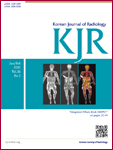
KOREAN JOURNAL OF RADIOLOGY
Transforming Radiological Practices Through ResearchKorean Journal of Radiology (ISSN: 1229-6929, E-ISSN: 2005-8330), published by the Korean Society of Radiology, stands as a leading international platform for the dissemination of high-quality research and advancements in the fields of radiology, nuclear medicine, and imaging. With a remarkable impact factor and ranked in the Q1 quadrant in its category, this journal showcases cutting-edge studies, clinical investigations, and comprehensive reviews that significantly contribute to the understanding and practice of medical imaging. Researchers, clinicians, and students alike will find the journal an invaluable resource, featuring innovative methodologies, case studies, and essential updates in imaging technology. Since its inception in 2000 and continuing through 2024, the Korean Journal of Radiology remains dedicated to promoting excellence and fostering collaborative research within the global radiology community, underscoring the importance of imaging in modern medicine.

EUROPEAN JOURNAL OF RADIOLOGY
Pioneering Insights for Radiology ProfessionalsThe European Journal of Radiology, published by Elsevier Ireland Ltd, is a premier peer-reviewed journal in the fields of radiology, nuclear medicine, and imaging. Established in 1981, it has carved a significant niche within the academic community, showcasing innovative research that enhances medical imaging practices and improves patient care. With an impressive ranking in the Q1 category for both Medicine (miscellaneous) and Radiology, Nuclear Medicine, and Imaging in 2023, the journal is recognized globally for its commitment to advancing scientific knowledge and improving imaging methodologies. The journal's Scopus ranking of #60/333, placing it in the 82nd percentile, underlines its reputation for high-quality research and scholarly contributions. While traditionally a subscription-based journal, it continually evolves to meet the demands of the academic landscape, aiming to bridge the gap between research and clinical practice. Researchers, healthcare professionals, and students alike can benefit from exploring its extensive archives and current publications, which are curated to foster education and innovation in the medical imaging domain.

Insights into Imaging
Unlocking the Future of Radiological ScienceInsights into Imaging is a prominent open-access journal published by SPRINGER WIEN, specializing in the dynamic fields of radiology, nuclear medicine, and imaging, with its ISSN 1869-4101. Established in 2012, the journal has established itself as a leading platform for disseminating high-quality research and innovative findings, currently holding a prestigious Q1 ranking in its category as of 2023. With an impressive Scopus rank of #42 out of 333 in the medicine discipline, the journal is positioned in the 87th percentile, reflecting its significance and influence in the academic community. Based in Germany, Insights into Imaging not only provides unrestricted access to research but also aims to bridge the gap between scientific inquiry and clinical application, making it an essential resource for researchers, professionals, and students engaged in advancing imaging technologies and practices. The journal’s commitment to fostering knowledge exchange ensures that it remains a critical contributor to the evolving landscape of medical imaging, with articles available from 2012 through 2024.
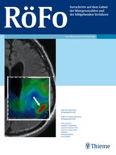
ROFO-FORTSCHRITTE AUF DEM GEBIET DER RONTGENSTRAHLEN UND DER BILDGEBENDEN VERFAHREN
Empowering Knowledge in Radiological AdvancementsROFO-Fortschritte auf dem Gebiet der Röntgenstrahlen und der bildgebenden Verfahren, published by Georg Thieme Verlag KG, is a pivotal journal in the fields of radiology and nuclear medicine, offering invaluable insights for researchers, healthcare professionals, and students alike. With an ISSN of 1438-9029, this journal has been a stalwart of scientific communication since its inception in 1975, actively contributing to advancements in imaging techniques and radiation therapy. Although it operates under traditional access, the journal maintains a respectable standing, reflected by its Q3 ranking in Radiology, Nuclear Medicine and Imaging and Q4 in Medicine (miscellaneous), highlighting its significance in the scholarly community. Its coverage spans a wide array of topics pertinent to diagnostic imaging and therapy protocols, making it an essential resource for anyone seeking to understand the complexities of modern radiological practices. As the journal continues to evolve through 2024, it invites contributions that enrich the dialogue around technological innovations and clinical applications in the realm of imaging modalities.

Emergency Radiology
Pioneering Research in Critical Imaging SolutionsEmergency Radiology, published by SPRINGER HEIDELBERG, is a leading journal in the fields of emergency medicine and radiology, dedicated to advancing the understanding and application of diagnostic imaging in urgent medical conditions. Established in 1994, this journal has consistently contributed to the discourse around emergency diagnostics, maintaining a strong position within the academic community, as evidenced by its Q2 rankings in both Emergency Medicine and Radiology, Nuclear Medicine and Imaging categories as of 2023. With a distinguished focus on innovative research and case studies, it serves a diverse audience of researchers, clinicians, and healthcare professionals who seek to enhance their knowledge and improve patient outcomes in emergency settings. While the journal is not currently open access, it offers robust subscription options and continues to be an integral resource for those at the forefront of emergency care. With an ISSN of 1070-3004 and an E-ISSN of 1438-1435, Emergency Radiology is positioned to remain a key player in shaping the future of medical imaging through its commitment to high-quality research and evidence-based practices.
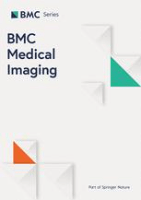
BMC MEDICAL IMAGING
Exploring Cutting-edge Techniques in Radiology and Nuclear Medicine.BMC Medical Imaging is a premier open-access journal dedicated to advancing the field of radiology, nuclear medicine, and imaging technologies. Published by BMC in the United Kingdom, this journal serves as a vital resource for researchers, clinicians, and students, fostering a collaborative environment for sharing innovative findings and methodologies in medical imaging. With a commendable impact factor and an impressive Scopus ranking within the top 35% of its category, BMC Medical Imaging provides a platform for high-quality research to be disseminated widely and freely since its inception in 2001. The journal aims to cover a diverse array of topics, from advanced imaging techniques to their clinical applications, enhancing the understanding and effectiveness of diagnostic practices. By contributing to the body of knowledge and facilitating open access to research, BMC Medical Imaging plays a pivotal role in shaping the future of medical imaging and improving patient care.
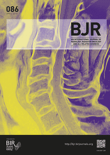
BRITISH JOURNAL OF RADIOLOGY
Pioneering Research for the Future of ImagingBritish Journal of Radiology is a leading peer-reviewed journal published by the British Institute of Radiology, dedicated to advancing the field of radiology, nuclear medicine, and imaging. With a prestigious history dating back to 1945, this journal is at the forefront of disseminating cutting-edge research and innovations that significantly impact clinical practice. Currently enjoying a Q1 ranking in the field of radiology and Q2 in general medicine for 2023, it is recognized for its rigorous standards and high-quality content, ranking #87 out of 333 in Scopus for specialties related to Medicine, Radiology, Nuclear Medicine, and Imaging, placing it in the 74th percentile. Researchers, professionals, and students are encouraged to engage with the latest findings and comprehensive reviews presented within its pages, which contribute not only to academic discourse but also to the evolution of practice in the wider medical community.

Imaging
Pioneering Research in Radiology and BeyondImaging, published by AKADEMIAI KIADO ZRT, is an esteemed open-access journal dedicated to the field of medical imaging, established in 2020. With an E-ISSN of 2732-0960 and based in Budapest, Hungary, this journal provides a vital platform for the dissemination of cutting-edge research and advancements in imaging techniques, especially in the realms of radiology, nuclear medicine, and ultrasound technology. While currently positioned in the Q4 category across multiple medical specialties, the journal continues to strive for improvements in visibility and impact, contributing to the evolving discourse in medical imaging. The journal aims to facilitate an inclusive and collaborative environment for researchers, professionals, and students, inviting them to share their findings and insights to enhance the field's development. With open-access availability since its inception, Imaging ensures free and easy access to its content, fostering a greater understanding and appreciation of innovative imaging practices worldwide.